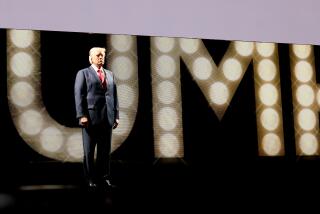This Apple Landed Far From the Tree
- Share via
PRINCETON, N.J. — It’s a fashionable assumption, fanned by a rash of popular books, that George W. Bush is the latest star of a long Bush dynasty, the inheritor of his equally famous father’s political mantle. But to many conservatives he is less his father’s son and more the political descendant of Ronald Reagan.
At the American Conservative Union’s 40th anniversary celebration this month in Washington, the distance between the two Bush presidents in the minds of conservatives couldn’t have been clearer. At the black-tie event, which featured many of the conservative movement’s most noted luminaries, from Jesse Helms to Phyllis Schlafly, the keynote speaker and most prominent celebrant was the movement’s current hero, George W. Bush.
It was a far cry from the reception Bush’s father got in 1981, when, despite having been picked by Reagan to be his vice president, he was denied even a minor role at the Conservative Union’s convention.
It was a year of celebration. Reagan’s victory in 1980 had not only recaptured the White House but had swept enough additional conservatives into Congress -- both Democrats and Republicans -- to give Reagan a working legislative majority. Movement activists had captured the party from its so-called “Rockefeller” or “moderate” wing and, after tolerating the presidencies of Richard Nixon and Gerald Ford, at last had a president they could fully embrace. They had gotten their candidate into office by working hard in the Republican presidential primaries to defeat George H.W. Bush, a man many considered to be a liberal in the Rockefeller tradition.
Bush’s selection as Reagan’s running mate was dismissed by conservatives as merely a tactic designed to give Reagan centrist credentials. And to some extent, that was true. As a congressman, I directed a group of congressional task forces advising the Reagan campaign, and I was therefore invited to meet with Reagan to discuss potential running mates. Those who supported Bush for that position -- myself among them -- were thinking almost exclusively about ways to add strength to the ticket as it prepared for the general election.
Soon after the vote in November, James Baker, who had been Bush’s campaign manager and was soon to become Reagan’s White House chief of staff, invited three or four leading conservatives to a meeting at Blair House. As the American Conservative Union’s national chairman at the time, I was at the meeting. What Baker wanted to know was how he could help the new vice president improve his rocky relationship with conservatives, almost all of whom had avidly supported Reagan for the presidential nomination. The annual Conservative Political Action Conference, which I was also chairing, was rapidly approaching.
Because it seemed to me it would be a good thing for both Bush and conservatives if the distance between them could be bridged, I proposed to my fellow conference organizers that Bush be given a spot on the program. Reagan was to be the keynoter at that year’s black-tie dinner, and I thought it would be appropriate for his vice president to be one of the other featured guests. The proposal was summarily dismissed.
George H.W. Bush appeared at that year’s conference only because I managed to arrange a private breakfast -- not part of the official program -- and invited the vice president to speak as my personal guest. To their credit, a number of conservative activists did attend and listened respectfully, but attendance was sparse compared with the turnout for the “accepted” speakers whom the conservatives considered to be “in the fold.”
Over the years, the first President Bush did manage to persuade conservatives to include him in their events, particularly after he became president, but he never managed to be fully accepted as Reagan was -- and as his son now is. When conservatives rose to their feet to cheer the keynote speaker last week, it wasn’t the biological son of George H.W. Bush they were applauding: It was the political son of Ronald Reagan.
More to Read
Get the L.A. Times Politics newsletter
Deeply reported insights into legislation, politics and policy from Sacramento, Washington and beyond. In your inbox three times per week.
You may occasionally receive promotional content from the Los Angeles Times.










